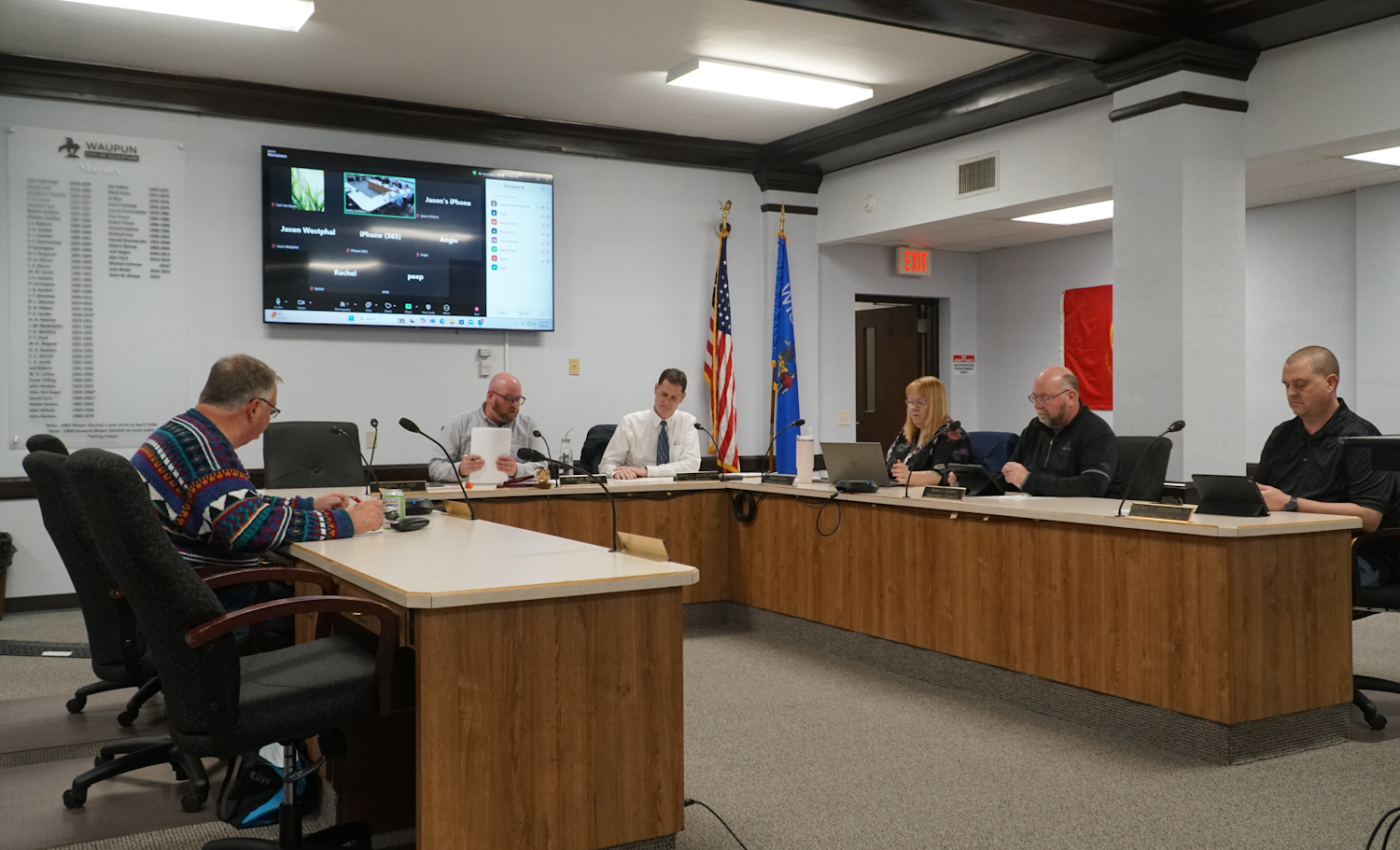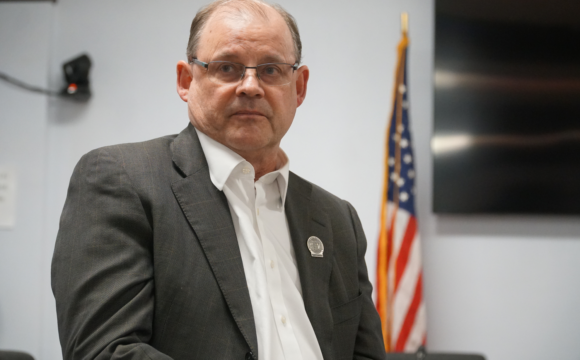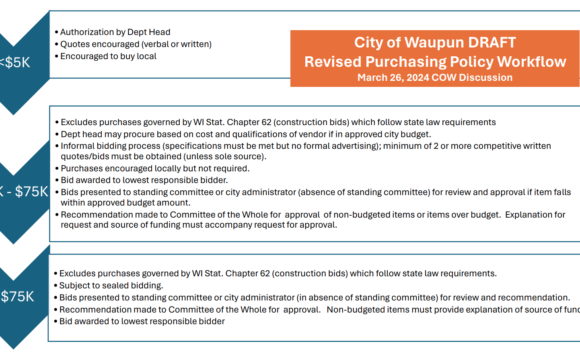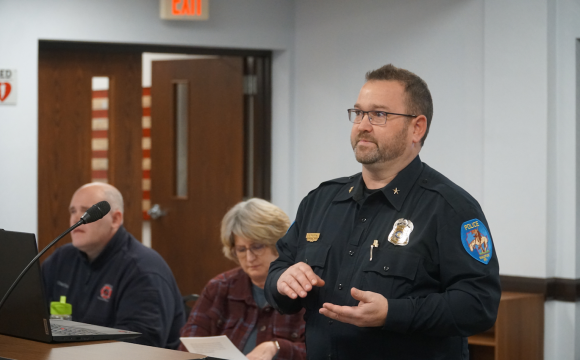Video can be found at bottom of article.
WAUPUN — The Waupun City Council failed to override a veto at the Common Council meeting held Tuesday, April 8, 2025.
Two weeks prior, the City Council passed a motion to hire consultant agency Vandewalle to create an Affordable Housing Strategy for the City of Waupun, which Mayor of Waupun Rohn Bishop veto’d on the grounds of not having enough time for the community to understand it, and being a potential waste of funds.
The discussion opened with input from City Attorney Dan Vande Zande that the veto override as written would require a two-thirds vote of all members, and that even with a vacant seat that is still five votes.
Alderman Pete Kaczmarski then asked City Administrator Kathy Schlieve to reiterate why the study would be important, what the city has done in the past, and how it might impact things going forward.
Schlieve said that the 2020 study found that there wasn’t enough housing of all types in Waupun, and that many of the houses in town are old and need significant repairs to be up to code. According to Schlieve, 30% of housing in Waupun was built before 1939, and 79% before 1990.
She also mentioned that the Affordable Housing Fund from a recently closed TID needs an outlet, and this could be used to assist repairs in the community along with creating new developments.
Schlieve went on to describe the state of the current housing market, which included construction constraints (material costs, labor costs, increased regulations, etc) that make it hard for new development. She also noted that the price of entry-level homes have increased significantly, and reiterated there only being five homes in Waupun on the market at any given time. The high cost of new city infrastructure (streets, utilities, etc) also strains development.
“I think the real question is, ‘Can you build the house you grew up in, in this community today?’” Schlieve said. “And can the people we need as essential workforce afford to buy those homes?”
If Waupun passed the study, it would provide a number of specific deliverables: target affordable housing fund, audit and identify zoning changes, bring the City into compliance with State requirements for contractors to qualify for incentives, and provide more accessability for essential workforce.
Mayor Bishop pointed out that many people have asked him why the city needs to spend money on the study, and that many people don’t understand the necessity of hiring consultants for issues the City already recognizes.
“Everything you said is 100% right, but what the average voter would say to me is ‘why do you have to spend $15,000 when Kathy just told us everything we need to know,’ and I don’t have an answer for that,” Mayor Bishop said. “We spend a lot of money on surveys and studies. I know we have a housing shortage, I know we need smaller lot lines, I know we need to get teachers and prison guards living here. We need apartment buildings built, I know we need to build duplexes and townhouses so we can get senior citizens to buy single floor housing so we can open up houses for families to move to Waupun.”
“I know there’s more people that want to live in Waupun than we can house because it’s the greatest little city in the State of Wisconsin to live in, and we also know that land is a premium because the people who own the land that border the city don’t want to sell it at the current price,” he said. “I’m not trying to be a smart alec, but we know these things. What does $15,000 tell us that we don’t know? And I need that answer when I go out in the public and people call on me for it, because these are the questions I do get.”
Schlieve said that the study may help them get access to more incentives from the State of Wisconsin for contractors to work here, primarily that the study would qualify developers to apply for low interest loans from the State for new developments.
She also reiterated that this expenditure comes from the restricted Affordable Housing Fund from TID 1, and is not a general fund expenditure.
Kaczmarski said that meeting the requirements for the incentives for developers is the city’s responsibility, and that other communities are starting to go in this direction. He also said that since he does not have any background in residential development, that he feels that he needs more direction from consultants who have expertise in it.
“I don’t want to spend any more money than I have to, but if it gives me better direction—especially if I am getting no comments from my constituents—it’s time to step up to the plate to get more knowledge, that’s what’s going to help me with the study,” Kaczmarski said.
Alderman Dan Siebers asked the Mayor if Schlieve answered his questions, regarding the contractors getting incentives from the study. Siebers asked if it would reduce the cost of housing, which it wouldn’t since that would be market rate—it would just reduce costs for developers.
“We don’t have a shortage of developers, we have a shortage of land,” Mayor Bishop said.
Siebers said they still need the study to provide infrastructure. Schlieve said $1,000 per linear foot, putting that cost on the developers would increase construction costs $100,000 per home.
Kaczmarski asked about which programs the incentives are targeting. Schlieve said there were three target groups: restoring downtown upper level apartments, increasing roadway development, and another program called “vacancy to vitality” which would convert vacant commercial properties into housing.
Alderman Jason Westphal asked if they could still get a way to qualify if the City did the work themselves even if they don’t do the study. He then asked if they did do the study, whether the City would still have control over the types of projects they would bring to the City. Schlieve said it would not change the way the City does development agreements. As for doing the work themselves, it’s a staff capacity question—whether the City has the people to actually accomplish it, which it won’t be within the next year.
Westphal said that “it seems like a no brainer” to use money from the affordable housing fund for the study, especially since it will help bring Waupun into compliance to qualify for incentives without losing the community’s autonomy.
Kaczmarski asked what would happen if they passed on voting on it. Vande Zande said that the veto would hold except in the case of getting over 5 votes. He noted that they could bring it up at the next meeting after the reorg, or after several months if that is what they desire. Kaczmarski noted that the newly elected 3rd District Alderman Ryan Mielke would be seated at the next meeting, but that he did not want to bring it to the immediate next meeting as to bring Mielke up to speed before making large decisions.
Kaczmarski then said he did not mean any disrespect to Mayor Bishop but made a motion to override the veto, which was seconded by Siebers.
Siebers acknowledged the letter from Dodge County Sheriff Dale Schmidt, saying it was well written and a good caution on the issue.
Alderman Mike Matoushek expressed concern about how often the City pays for studies, and asked how similar this one is to the study in 2020. Schlieve said that the 2020 study was about comparing the issues the community is facing with trends across the country but this one will give a more in depth action plan.
Matoushek said that the 2020 study may have dropped the ball in not giving a more actionable recommendation, but Schlieve said that she felt that things have changed a lot since 2020 that this study would be much more beneficial to the here and now compared to what the previous one could have.
On roll call: Matoushek Nay, Siebers Aye, Kunz Aye, Kaczmarski Aye, Westphal Aye. Motion failed, veto upheld.
Before moving on to the next item, Matoushek asked if it could be brought to an upcoming meeting, which Vande Zande confirmed would be allowed. Vande Zande explained that the guidelines set by Robert’s Rules of Order would normally limit the reintroduction of motions before a certain time but those provisions are meant for a larger body, so the City Council would be fine to bring it back at a future meeting for further discussion.
Matoushek then made an official request for the matter to be brought to the May Common Council meeting. The Council then moved onto other items.
Dodge County Supervisor for the 25th District, Evan Meinel, who represents part of Waupun, briefly spoke before the meeting in support of Mayor Bishop’s veto.
Also discussed at the meeting were the Firefighter and EMR salary increases, and the mayoral term length. Both of these items passed after short discussions.
Timestamps:
0:00 – Intro
1:42 – Why does this study need to be done?
7:34 – “What does this $15,000 tell us that we don’t know?”
8:44 – Developer Incentives
10:08 – Affordable Housing Fund
13:00 – “Has it answered your question?”
14:35 – “We have no shortage of developers, we have a shortage of land”
16:21 – Program Targets
17:28 – Options with and without the study
19:55 – Question on the Motion
21:29 – Motion to Override Veto
26:53 – Continue at next Council










